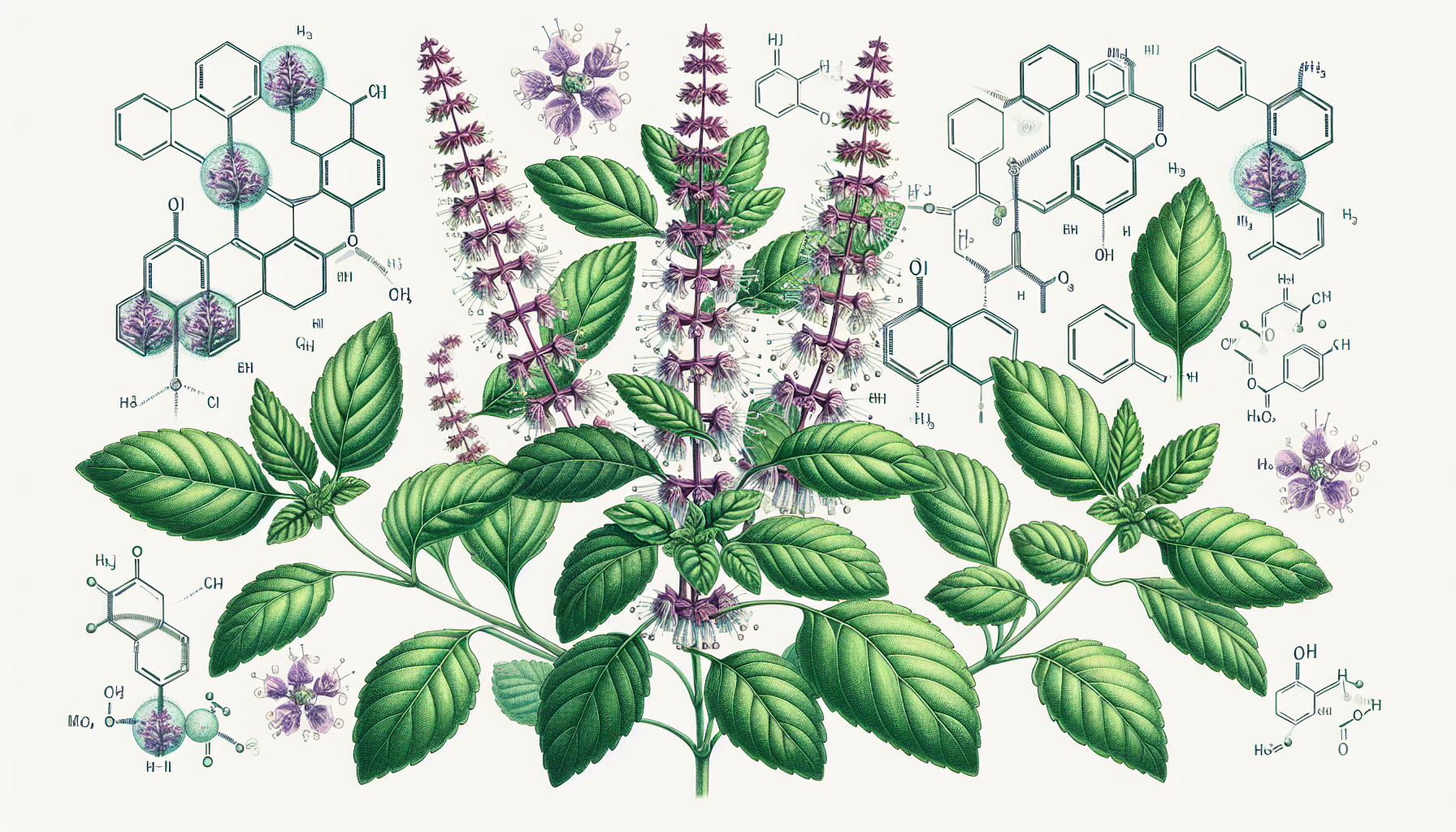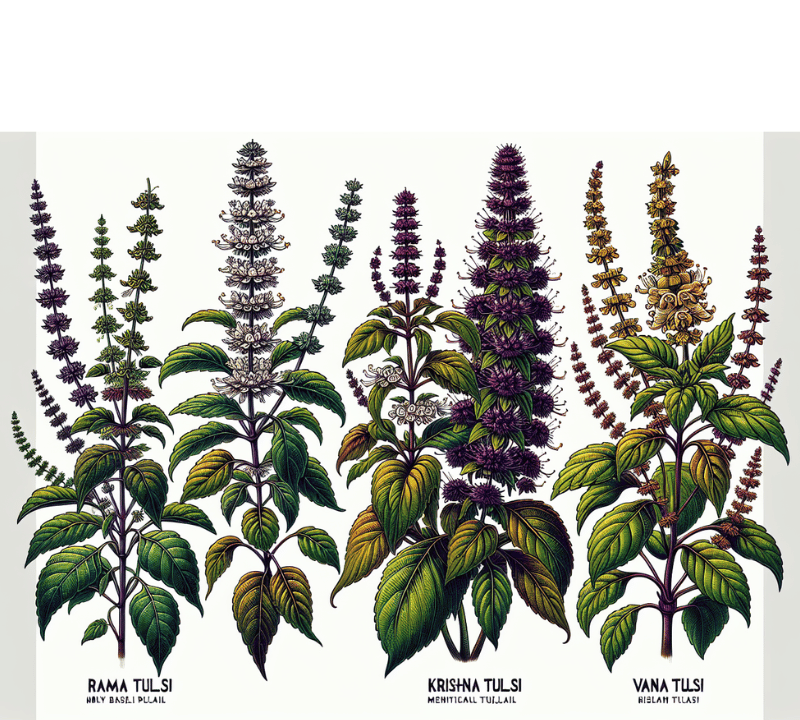In Ayurvedic medicine, holy basil (Ocimum sanctum) stands out for its extensive medicinal properties, offering various health benefits. Known in multiple forms as Rama Tulsi, Krishna Tulsi, and Vana Tulsi, each type brings its own set of unique benefits to the table. As we set out to answer the question of which holy basil is the most medicinal, we're not just examining a plant; we're uncovering centuries-old secrets of wellness and healing. This journey is not merely about comparing leaves; it's about understanding how these varieties contribute to our health, from managing blood sugar and blood pressure to their antioxidant and anti-inflammatory capabilities. Among the tranquility of Rama, the intensity of Krishna, and the wild spirit of Vana, we seek to identify which holy basil variant reigns supreme in medicinal value.
Our exploration is grounded in scientific research and human clinical trials, offering a bridge between ancient wisdom and modern science. As we navigate through the myriad benefits of the holy basil plant—from its role in reducing blood glucose levels and improving wound healing to its efficacy in treating skin diseases and mitigating metabolic stress—we'll discover how this medicinal herb can be seamlessly integrated into our daily lives, whether through holy basil tea, supplements, or the essential oil extracted from its leaves. However, the path to harnessing the full potential of holy basil comes with its caveats, as interactions with medications, particularly those affecting blood clotting and blood pressure, warrant a cautious approach. With a conversational, informative, and friendly guide by your side, this article aims to illuminate the path to selecting the most medicinal holy basil for your health regime, ensuring you make informed choices with the blessings of Ocimum sanctum leaf extract lighting your way.
Key Takeaways
- Holy Basil, also known as tulsi, is valued in Ayurvedic medicine for its stress relief, anti-inflammatory properties, and potential to alleviate various health conditions. It is available in different varieties, such as Rama Tulsi, Krishna Tulsi, and Vana Tulsi, each with unique medicinal characteristics.
- Holy Basil exhibits significant health benefits, including improving attention, memory, and metabolic health parameters (blood glucose and cholesterol), and enhances wound healing and skin health due to its antioxidant, antibacterial, and anti-inflammatory properties.
- While Holy Basil can be integrated into wellness routines through supplements, tea, or cooking, it is essential to know its safety profile, drug interactions, and precautions, especially for pregnant women, those on blood-thinning medications, or individuals preparing for surgery.
Exploring the Medicinal Varieties of Holy Basil
Holy Basil is not merely an Ocimum sanctum L or tulsi culinary herb. Appreciated for centuries in Ayurvedic medicine, this herb possesses potent medicinal properties that offer stress relief, alleviate inflammation, and reduce joint pain. All parts of the plant - leaves, stems, and seeds, are utilized for their versatile medicinal purposes, which range from anxiety relief to dental health promotion and Parkinson’s disease symptom reduction. One of the most effective forms of this herb is ocimum sanctum leaf extract, which harnesses the power of the plant’s leaves.
Rama Tulsi, Krishna Tulsi, and Vana Tulsi are the three main types of holy basil, each showcasing distinct medicinal characteristics.
Rama Tulsi: The Gentle Healer
Rama Tulsi, characterized by its light purple flowers and milder flavor, is not just a plant but a revered medicinal panacea in Hinduism, often incorporated into religious occasions and festive rituals. Thanks to its significant eugenol content, it is the gentle healer among the holy basil varieties. Eugenol, a compound found in various essential oils, contributes to the health benefits of Rama Tulsi, providing stress relief and bolstering the immune system.
Envisage a stressful day fading away as you sip a cup of holy basil tea made from Rama Tulsi leaves, which ushers in tranquility and relaxation.
Krishna Tulsi: The Potent Protector
In contrast, Krishna Tulsi, recognizable by its purple leaves and strong clove-like aroma, is a potent protector within the holy basil varieties. It’s used extensively in traditional medicine for treating:
- infections
- throat problems
- earaches
- skin diseases
This is thanks to its high concentration of phytochemicals like methyl eugenol, β-caryophyllene, and α-cubebene, which can be found in specific leaf extracts.
Krishna Tulsi tea boosts physical and mental endurance while invigorating body, mind, and spirit, fostering overall health and well-being.
Vana Tulsi: The Wild Elixir
Vana Tulsi, also known as wild forest tulsi, stands tall among the holy basil varieties. As a perennial, woody bush, it can grow up to 2 meters in height and is best suited for full sun and dry conditions. The leaves of Vana Tulsi are traditionally used to make stimulating tea, which is believed to benefit the body, mind, and spirit.
Apart from its medicinal purposes, it also plays a significant role in Indian spiritual traditions, where it is used ceremonially. The robust aroma and spicy flavor of Vana Tulsi tea serve as a healthier and invigorating alternative to caffeine-rich beverages.
Comparative Analysis: Potency of Holy Basil Varieties

The unique chemical composition of each holy basil variety is the primary source of their potency. Some holy basil types have higher concentrations of eugenol, while others are rich in methyl eugenol. The essential oil in holy basil, including compounds like eugenol, β-caryophyllene, and β-elemene, paint the plant’s distinct aroma and therapeutic potential.
This chemical diversity across holy basil varieties lends the herb its versatility in tackling various health issues.
Impact on Blood Glucose and Cholesterol
Holy basil’s impact on health extends to crucial metabolic parameters such as blood sugar and cholesterol levels. The herb exhibits cardioprotective properties, demonstrated by its capacity to reduce fasting blood glucose levels and improve lipid profiles. One key compound that plays a pivotal role in these metabolic benefits is eugenol. This compound, found in holy basil oil, is known to lower stress-induced cholesterol levels.
Consumption of fresh holy basil leaves reduces ‘bad’ cholesterol (LDL-cholesterol) and an increase in ‘good’ cholesterol (HDL-cholesterol). However, individuals with diabetes or those on blood sugar-lowering medications should exercise caution as holy basil may lower blood sugar levels, necessitating an adjustment in medication dosage.
Anti-inflammatory and Antioxidant Capabilities
Alongside these, holy basil boasts remarkable anti-inflammatory and antioxidant capabilities. The herb’s anti-inflammatory properties involve modulation of immune response through effects on cytokines and regulation of nitric oxide. This means that holy basil can affect the count of various immune cells, including lymphocytes, leukocytes, granulocytes, and monocytes, during acute inflammatory responses.
The antioxidant effects of Holy basil are attributable to constituents like rosmarinic acid, which combats oxidative stress by scavenging free radicals. This dual action of anti-inflammatory and antioxidant capabilities makes Holy basil a versatile herb for overall health.
Health Benefits of the Most Medicinal Holy Basil

Holy basil brings a potpourri of health benefits to the table. Some of its benefits include:
- Improving attention and memory
- Exhibiting immunomodulatory effects
- Supporting gastrointestinal health
- Demonstrating improvements in metabolic conditions such as blood glucose in diabetes, cholesterol in hyperlipidemia, blood pressure in hypertension, and body mass index (BMI).
Targeting Metabolic Stress
One significant area where holy basil makes a difference is targeting metabolic stress. The herb’s adaptogenic and antistress effects reduce the damaging effects of stress while enhancing physical performance, which is crucial for managing metabolic stress. Holy basil tea influences cortisol hormones, helping to balance adrenal glands, thereby regulating stress and anxiety. By modulating the stress response and increasing adaptive energy, the herb reduces metabolic stress and elevates the ‘Vital Spirit.’
Besides, by targeting metabolic stress, holy basil aids in weight loss and helps regulate cholesterol levels, making it a perfect addition to your wellness routine.
Enhancing Wound Healing and Skin Health
Krishna Tulsi and holy basil have several benefits for wound healing, including:
- Krishna Tulsi has antiseptic qualities that support wound healing.
- Holy basil contains ursolic acid, which enhances skin elasticity and promotes skin healing.
- Holy basil supports wound healing by increasing a wound’s breaking strength, shortening healing time, and enhancing wound contraction.
In addition to this, holy basil has several benefits for the skin, including the use of holy basil seed oil:
- Anti-inflammatory properties that help reduce redness and swelling
- Antioxidant properties that protect the skin from damage caused by free radicals
- Antibacterial properties that help fight acne-causing bacteria
- Moisturizing properties that keep the skin hydrated and supple
With all these benefits, holy basil is a staple in your medicine cabinet and a promising ally in your skincare routine.
Safety Profile and Precautions When Using Holy Basil

Despite the impressive health benefits of holy basil, awareness of precautions associated with its use is vital. Here are some precautions to keep in mind:
- Holy basil might increase the risk of bleeding and should be avoided before surgery.
- Pregnant women should avoid it as it may affect the implantation of a fertilized egg and impact thyroid medication efficacy.
- It’s crucial to consult healthcare providers before taking holy basil.
- Its use should not exceed eight weeks without medical advice.
Understanding Drug Interactions
The potential for holy basil to interact with certain medications underlines the necessity of comprehending possible drug interactions. For instance, the herb might decrease levels of the thyroid hormone thyroxine, potentially exacerbating hypothyroidism. Moreover, when taken with drugs that slow blood clotting, such as aspirin and warfarin, holy basil could increase the likelihood of bruising and bleeding due to its possible blood-thinning effects.
Hence, individuals on anticoagulant treatments should exercise caution as holy basil may amplify the effects of these medications, based on findings from human clinical trials.
When to Avoid Holy Basil
Certain groups need to exercise caution or avoid the use of holy basil. Women who are pregnant or attempting to conceive should avoid the herb as it may affect the uterus and fetal development. Moreover, usage of holy basil should not extend beyond eight weeks due to insufficient safety data for long-term use. If you have allergies or sensitivities to the Lamiaceae (mint) family, you should avoid holy basil to prevent allergic reactions.
Furthermore, individuals who are breastfeeding, on blood-thinning medication, or preparing for surgery should exercise caution or avoid holy basil.
Integrating Holy Basil into Your Wellness Routine

Even with these precautions, you can easily incorporate holy basil into your daily wellness routine. Available in various forms, such as supplements in pill or capsule form and as a culinary herb, the general preventive dosage ranges from 300 mg to 2,000 mg per day.
You can enjoy the benefits of the holy basil plant by relishing it as a calming tea or adding it to your culinary creations, including sweet basil; for a quick overview, check out this summary holy basil guide.
Dietary Supplements and Standardized Extracts
Turning to dietary supplements and standardized extracts is a wise choice for those looking to harness the potent benefits of holy basil in a more concentrated form. These supplements, enriched with holy basil extract, offer a reliable way to enjoy the herb's health advantages with consistent dosing. Standardized extracts, in particular, are designed to deliver a precise concentration of the active ingredients, ensuring that each pill or capsule form you take holds the same therapeutic potential. With many products claiming safety and efficacy, the market for holy basil supplements is vast. However, discerning consumers should prioritize choosing supplements verified by reputable third-party testers like USP, ConsumerLab, or NSF. This vetting process guarantees the supplements meet stringent quality and purity standards, offering peace of mind and health benefits.
In pursuit of further guidance on selecting the right holy basil supplement for your wellness routine, our article “From Stress-Busting to Immunity: A Guide to the Best Holy Basil Supplement” is invaluable. It delves into the nuances of five leading holy basil supplements, showcasing their unique features and how they stand out in the market. This dedicated analysis provides a deeper insight into each supplement's efficacy, helping you make an informed decision tailored to your health needs. For a comprehensive look at the top contenders in holy basil supplementation and to find the perfect match for your health regimen, follow this link to our detailed guide; there is a bonus for you in this article as well - check it out!👇
Culinary Uses: Tea and Cooking
In addition to supplements, you can enjoy holy basil in its natural form. Here are some ways to incorporate holy basil into your daily routine:
- Holy basil tea or kadha can be consumed for detoxification and blood purification, serving as a calming daily ritual for relaxation and mental well-being.
- The leaves of holy basil can also be used fresh in juices, salads, and as a topping for fruits.
- Dried holy basil can infuse dishes like rice with a unique flavor, contributing to overall health and stress management.
A ¼-cup serving of fresh holy basil leaves is rich in essential nutrients, including vitamins A, C, and K, iron, calcium, and manganese, enhancing daily intake.
Rama, Krishna, Vana: Concluding Insights on the Most Medicinal Holy Basil
In the ever-expanding field of herbal medicine, holy basil emerges as a cornerstone, bringing together a spectrum of health benefits that cater to the mind and body. As an emblem of Ayurvedic tradition, holy basil—or Ocimum sanctum—stands tall, offering relief from stress, a reduction in inflammation, and a boost to memory and metabolic health. This versatile herb, available in three forms, Rama Tulsi, Krishna Tulsi, and Vana Tulsi, enriches our palates and health through its potent leaf extracts and essential oils. Whether infused in tea, encapsulated in dietary supplements, or integrated into culinary creations, holy basil transcends mere flavor, acting as a natural healing and well-being conduit. Its benefits are anchored in a rich body of scientific research, including human clinical trials highlighting its role in regulating blood sugar and blood pressure, enhancing wound healing, and protecting against skin diseases.
However, the journey with holy basil is one of mindful exploration. As we embrace its myriad health benefits, it's crucial to navigate its use with informed caution, especially considering potential interactions with medications affecting blood clotting and blood pressure. Consulting with a healthcare provider becomes essential before incorporating this medicinal herb into your regimen, ensuring a harmonious blend of safety and efficacy. As holy basil continues to be celebrated for its antioxidant, anti-inflammatory, and antiseptic properties, it reinforces its status as a revered component of herbal medicine, promising a holistic approach to health and wellness.
Frequently Asked Questions
What brand of holy basil is best?
According to expert tests and reviews, Organic India's Tulsi-Holy Basil is one of the top brands of holy basil, if not the top. It is recommended for its quality and effectiveness. It is also listed as the first of the five supplements in our review article (linked above).
Which Tulsi is best for medicine?
Rama Tulsi is probably the best for medicinal purposes, as it has healing properties and is effective for relieving colds, fever, bronchitis, and cough.
What are the main types of Holy Basil?
The main types of Holy Basil are Rama Tulsi, Krishna Tulsi, and Vana Tulsi, each with distinct characteristics and uses.
Can Holy Basil interact with my medications?
Yes, Holy Basil may interact with certain medications, so it's essential to consult your healthcare provider before taking it as a supplement.
How can I incorporate Holy Basil into my diet?
You can incorporate Holy Basil into your diet by consuming it as tea, using it in cooking, or taking it as a supplement. Enjoy the benefits of this versatile herb in various forms.
Thanks for following along with us to explore the simple question: "Which Holy Basil is the most medicinal?" We hope this discussion has helped clarify the various forms of this fantastic herb. Also, if you want to add to your library of knowledge, you should check out the other article mentioned and linked above. It never hurts to add to your knowledge arsenal!
Please return soon to check out our next review of another incredible supplement – we’re always looking out for YOU!
*We are NOT qualified medical advisors. The content here is only based on our personal opinions and should NOT be used as a substitute for a healthcare professional's advice!











Member discussion